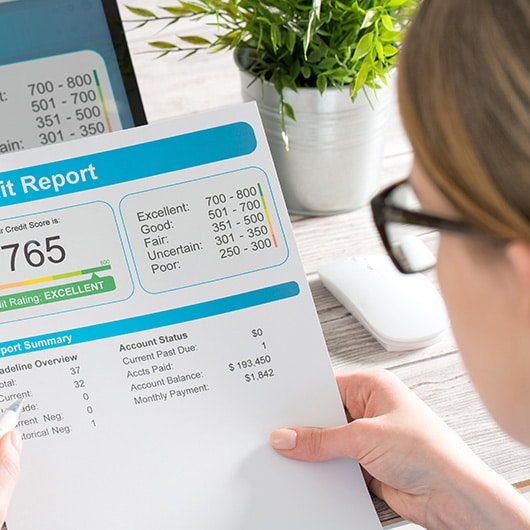How Will My Credit Affect My 30-Year Refinance?
Borrowing money from any financial institution and using debt to your advantage is a principal that relies entirely on your current credit score. Your credit score offers lenders, like Lending Studios, a picture of what kind of borrower you've been in the past. It’s the score that renders you a high or low risk borrower. In many ways, your credit score defines you and the kinds of opportunities you’ll be able to have in life. It’s a pillar of financial security for your future and present, thus, it’s no surprise that it has a very noticeable impact on your mortgage and refinancing opportunities. However, for some, it’s a genuine surprise as to just how much your credit score can affect your mortgages rates and all the aspects of the mortgage or refinancing application process.
In order to make strong, well-measured financial decisions. You need to be informed about all of the different factors that come into play during the refinancing process. So, let’s draw back the veil and discover just how much that FICO score really can alter your financial future.

The Credit Score Basics
Just like any other credit score-related query, good credit and poor credit land on the same scale for financing or buying a new house.

FICO Score Ratings Guide:
Exceptional Credit: 800 or Higher
Very Good Credit: 740-799
Good Credit: 670-739
Fair Credit: 580-669
Poor Credit: 579 or Lower
How Your Score Affects Your Refinance
Where you land on the above scale can dictate the kinds of refinanced mortgages you’ll be approved for, how much you’ll be able to borrow for your refinance, the mortgage rate you’ll secure on your loan, and how much your private mortgage insurance will be per month. For most refinances, you’ll need to have a credit score of at least 620 to be eligible for a loan. If your credit score is higher, or you’re working to make it higher than that, you’ll receive better terms on your refinance in essentially every way.
Regardless of your current credit score, we recommend exploring ways to improve your credit before applying for a refinance. Keep your credit score as high as possible if it’s already good by avoiding any new debt or any unnecessary hard credit score pulls on the account. There’s a number of things that you can do to improve your chances of securing better refinancing terms through improving your credit score alone. Whatever you can manage within the time frame you have laid out, we recommend taking advantage of it immediately because your credit score will have a direct effect on your monthly mortgage payment for your new home. If you consider how it will affect your interest rate alone, the difference between a 3.5% and 4% interest rate on a refinance for $200,000 is an average of $20,427 more over the span of a 30-year refinance. That’s a huge sum of money that could be saved just by paying a little more attention to the current state of your credit score.
This principle is solely based on the idea of risk-based pricing which guides lender’s hands when they’re approving or reflecting refinancing applications.

What Risks Are You Associated With?
Risk-based pricing is a strategy that lenders use to determine how much they’re willing to lend out, the kind of interest rate they’ll place on the loan, and if they’ll accept the loan at all. The strategy is built around assessing an individual’s financial risk based on the risk analysis of their credit profile. This strategy ensures that, as a general rule, the lower your credit score the higher your interest rate will be on your refinance.
If there is more risk associated with the account, the interest rate will be higher, because the lender will be under stress for the first couple years of the loan to ensure that they retrieve all of the capital they risked by lending to you. Higher interest rates means they recoup their initial investment faster, which is a safety precaution for higher risk lenders as they’re traditionally more likely to default on the loan and the lender could lose money on this.
Want specifics? A credit score of 625 compared to a credit score of 750 could add half a percent to the rate you will pay for the new loan. While that may not seem like a significant difference, it creates a gulf-sized gap in the total sums you could end up paying for your house and even your refinance. This is especially true since most folks refinance based on an interest rate decrease of even 1%. Diminish that benefit through a bad credit score and you may sacrifice the advantage of refinancing your home.
Securing the best possible interest rate is an important part of ensuring that you’re making the right decision with your 3-year refinance. If your credit score stands in the way, the consideration will become much more complex.
How Much You Can Borrow
The term “LTV” means your loan-to-value ratio. Your credit history can affect this portion of the refinancing process greatly. Essentially, your LTV acts as the percentage of the appraised value of your property that you’ll be able to borrow up to. For example, a 95% LTV qualification on a home appraisal of $350,000, would translate to $332,500 for your refinance loan total. A lower credit score will lower your total LTV available. That means that, while a person with a 750 credit score could acquire the 95% LTV approval, a person with a 670 score might only be approved for a 70% LTV. If you’re planning on using your 30-year refinance as a cash-out refinance for a home improvement or to pay for college loans, you might not get all of the funding you require.
Certain Programs May Be Restricted
If you’re looking into a “non-conforming” loan, or one that is not Fannie Mae or Freddie Mac, you’ll be restricted from pursuing certain loan programs outside of the standard if you have a impaired credit history. These non-conforming loans are often offered by private loan agencies and those lenders set their own rules for application. That often includes a limitation surrounding potential borrowers with low credit scores. Usually, if your score is beneath a certain level, you simply won’t pass the application process. These special scenarios are, to be fair, not the usual situation, however, depending on your individual needs it could present a limitation.
Your Private Mortgage Insurance
The other way that your credit score might affect your final monthly payment on your 30-year refinance is through your private mortgage insurance. Many lenders will require you to carry a PMI on your loan if you make a down payment that is less than 20% of the purchase price of the property. However, in terms of a refinance, your PMI requirement will be based on whether or not you have at least 20% equity in your home at the time of refinancing. The purpose of the PMI is to ensure that, in the event that you default on the loan, the lender is protected. Thus, it stands to reason that if your credit history carries more risks, the mortgage company will require you to pay more as you are, in their eyes, more likely to default on the loan.
As a general rule, the monthly PMI rates for the MGIC, one of the most common private mortgage insurers in the United States, are around .54% on a 95% loan with a credit score of 760 or greater. If you’re working on a $200,000 refinance, you’ll end up paying around $1080 per year in addition to your monthly mortgage payment. However, if your credit score is in the 679 or less range, that .54% will spike to a 1.15 percent on the same loan. This works out to be about $2300 per year in mortgage insurance alone. That means you can expect to more than double your mortgage insurance with a lower credit score.
Even a 50 point difference in credit scores could significantly alter the long-term cost of your house and your refinance.
Explore Our 30-Year Refinance Rates & Credit Score Assistance
Looking to refinance you home? LendingStudios.com offers resources and lending opportunities to people with any kind of credit score. Explore your options to improve your credit score and learn more about the kind of interest rates you can qualify for now on your 30-year refinance today.
Mortgage Calculators
Quickly predict your monthly mortgage payment and interest with this customizable tool!
Mortgage Resources
Leverage the tools you need to find a borrowing solution that fits your particular needs and budget.
Mortgage FAQs
Get answers to the most commonly asked mortgage questions.




